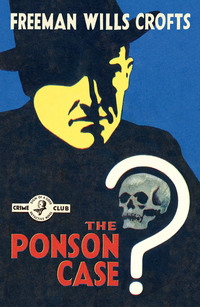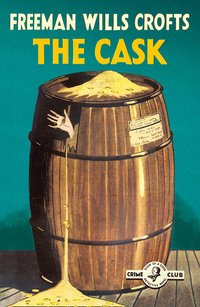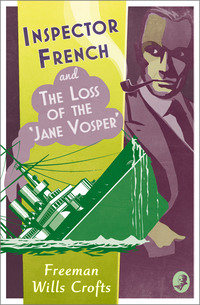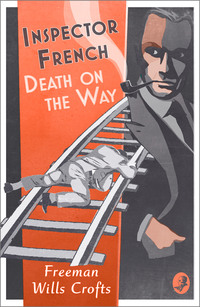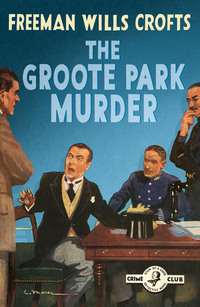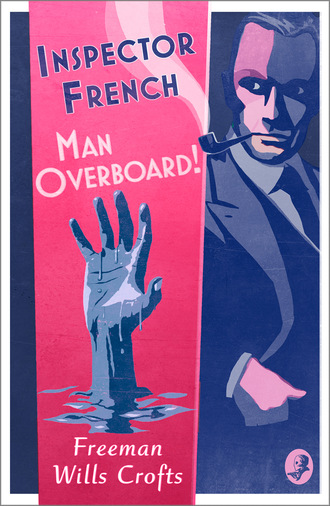
2
As Pamela Grey Saw It
‘It was six months or more ago,’ Ferris went on, ‘that Currie, one of our respected principals, was reading a paper before some society and he asked me to do some experiments to illustrate his remarks. It was on polymorphism and he had—’
‘Sorry to interrupt,’ Pam broke in, ‘but if you’re going to be understood, you must translate. Jack knows nothing of chemistry.’
‘I’m not a chemistry fiend,’ Penrose admitted judicially, ‘but if you can talk English, I’ll understand it.’
‘Right-o. I’ll talk in words of one syllable. Polymorphism means that certain substances can exist in more than one form. We have, for example, water, steam and ice. Speaking roughly, all three forms are composed of the same elements in the same proportions, but some people think that the atoms of each have a different arrangement.’
‘I can understand that,’ said Jack.
‘I wish I could,’ Ferris answered. ‘Anyway, several substances besides water occur in different forms, having different properties. Many of these are due to different crystalline arrangement, when they are called allotropic modifications. I needn’t go into it. There’s red and yellow sulphur, for example, and many others.
‘Going back to water, there’s a fourth form, besides water as we know it, steam and ice. There’s what has been called heavy water: water of the same elements as ordinary water, but with some of the elements in their heavy form. This liquid is heavier than ordinary water bulk for bulk. Its properties are different in other ways from ordinary water. Again I needn’t go into it?’
‘We’ll take it as read,’ said Jack.
‘All I’m trying to make clear is that polymorphism or this change in the form of a substance is a common thing in nature and every year they’re finding out more instances of it.’
‘I did a little of that in my chemistry course,’ said Pam.
‘That’s great. Then you won’t have any difficulty in following what I’m going to tell you. Well, Currie had a theory about heavy water that he wanted to put up in his paper, and I was working on it. I needn’t describe my experiments, but they were connected with passing various radiations through the water. I was working with a small quantity of water, about a tablespoonful, I should say. Ordinary water, I mean: not heavy water. I had the water in a test tube before I went for lunch, ready for me to begin work on it when I got back.
‘It happened that day M‘Morris had met some friends for lunch and they had got a bit jolly. You wouldn’t think it to look at M‘Morris, but it did happen. When he got back to the lab the idiot side of him was uppermost: and there’s a good deal of it, though again you mightn’t think it.’
‘Shut up, you silly ass,’ M‘Morris grunted. ‘Don’t mind him, Miss Grey. There’s not a word of truth in it.’
‘All right, you were perfectly normal and serious in what you did. Not through any joke but in perfect seriousness, as he now tells you, it occurred to him that it would be a wise and intelligent act to remove the water from my test tube and substitute petrol, which he happened to be using to fill a lighter. You wouldn’t believe it, but that’s what he did. Might have blown the whole place sky high.’
‘Rot! It couldn’t have done any harm at all, that little quantity. I’m not saying it was a very high type of humour, but some of us thought it would be interesting to see what Ferris would do when he didn’t get his reaction. Great new discovery in physical science made by Mr Fred Ferris and all that. Besides, see what the result has been.’
‘No thanks to you that any of us are alive. However, we needn’t pursue that side of it.’
‘Take it as read too,’ put in Jack.
‘Well, I don’t mind telling you that I was altogether done down by it. I got back from lunch and started on what I thought was water. And then I got the shock of my life.
‘It didn’t react as water should, but a pretty queer thing did happen. When the rays passed through it began to shrink. The volume decreased. It decreased till it was about two-thirds its former size.
‘I couldn’t make head nor tail of it. I kept the radiation on till all the shrinking seemed to be done. I thought I had somehow vaporised part of the water, but I hadn’t seen any steam. Then I wondered if I’d got some new form of heavy water. You understand I’d never carried out the experiment in quite the same way before. Certain unusual features were present which I needn’t go into. I can tell you I was fairly excited, but I decided to keep the thing to myself till I would find out more about it.
‘I next took the liquid from the apparatus and began to test it to see whether it really was heavy water. I found it extraordinarily inert. It had neither smell, taste nor colour, nor could I get any reaction from it of any kind or sort. It was clearly not ordinary water, nor the usual form of heavy water, and I thought I had come on still another polymorphic form.
‘Then I tried to repeat the experiment, and I was bothered worse than ever. I couldn’t repeat it. I couldn’t get the new liquid again.
‘I puzzled and puzzled, but couldn’t get any light. Then M‘Morris’s questions made me suspicious. He seemed to know too much. I pressed him till he admitted what he’d done.’
This story was quite unlike anything Pam had expected to hear. She was listening with immense interest, but still she couldn’t see what was coming or where the tale was leading. Jack was obviously interested, too. The others were clearly delighted with the way the tale was going.
‘You can imagine my next step. I tried again with the petrol and I got the same result as before. I was able to turn petrol into a new form, a new liquid I might say, a heavier liquid of smaller bulk, and so far as I could find, completely inert. Certainly it had lost all the properties of ordinary petrol.
‘Though I didn’t see then what this might involve, I swore M‘Morris to silence, and when we could, both of us worked at the affair. We learnt a good deal about the stuff, its atomic weight, and things like that, but nothing more of real interest. Except this—that I was able to prove that what I had was a dimorphic modification and not a new chemical form.’
‘By which,’ Pam added for Jack’s benefit, ‘I presume you mean that what you had was still petrol, though in another form, and not some other chemical compound?’
‘That’s putting it absolutely correctly. Well, by this time I had begun to look at the thing from the practical side instead of considering it a mere scientific curiosity. And I soon saw, as I expect you’ve seen by now, that there might be simply tremendous consequences in it. The great objection to petrol was its danger. Petrol in the new form was inert and therefore safe. It could be carried and handled and taken up in aeroplanes in complete safety. Being smaller in bulk, it could be transported more cheaply.
‘But obviously all these advantages could not be obtained if petrol proved to be monotropic. I mean’—he glanced at Jack—‘if the modification could only be made in one direction. Ordinary petrol could be changed into this inert liquid, but that was no use practically unless the inert liquid could be changed back again into ordinary petrol. If it could, and if it could be done simply and cheaply, I seemed to see cars and planes filled with safe, inert liquid, which just as it reached the motor was changed into the power stuff we know. You follow me?’
Pam certainly followed him. She sat motionless, trying to take in the vastness of the idea, and rather overwhelmed by it all. Why, if what Ferris was hinting at proved possible, there would simply be no end to the profits. Everyone would use the new stuff. Probably it would be made illegal to take the old explosive variety on to a public road or to fly with it. A safe petrol was one of the things the world most wanted. She almost gasped as she envisaged the possibilities.
‘Jolly fine notion, what?’ Jack pronounced, obviously also impressed.
‘Go on,’ Pam murmured to Ferris.
Ferris was clearly having the time of his life. His face was wreathed in smiles and his black eyes snapped with delight. He had probably been looking forward to this moment for weeks past. He settled himself in his chair and continued in a slightly more consequential manner.
‘You can imagine my next step. I again swore M‘Morris to secrecy, and we began going back to the lab in the evenings and working at the problem. Then I thought that if we were found at this, my results might be claimed by the firm, so we scraped up some money and took a room and worked there instead.
‘I needn’t tell you what we did, the hundreds, the thousands of attempts we made to solve the problem. For five months we spent practically every evening and weekend in that cursed room, trying one idea after another till both of us were sick and tired of the sight of the place, and were getting badly knocked up. I don’t mind admitting that I was considering giving up the job and getting what kudos I could out of reading a paper on what I had already done. And then, just a week ago, I solved it.’
‘Solved it?’ Pam repeated.
‘Solved it!’
‘You mean you turned the inert stuff back into ordinary petrol?’
Ferris grinned delightedly. ‘That’s just what I do mean. I’ve proved the stuff’s dimorphic; I can turn it backwards and forward from one form to the other just as I want to.’
Pam gave a great sigh while Jack murmured disjointed congratulations. Ferris sat smiling and rubbing his hands, the embodiment of delighted self-satisfaction. Already he was beginning to taste the triumph for which he had worked so long. Even M‘Morris looked happy.
‘Go on,’ Pam said again. ‘Let’s hear more details.’
Ferris’s face changed. ‘That’s the best side of it I’ve told you,’ he continued. ‘That was the great difficulty, and it’s been overcome. But I don’t mean that the whole problem has been solved. Not by any means. There’s a whole lot still to be done. If I tell you two further points, it’ll let you know just how the affair stands.’
‘It seems to me utterly wonderful,’ Pam interjected. ‘It’s so big and far reaching. It looks like a glimpse into a new world. There’s simply no end to what it may involve.’
‘That’s what M‘Morris and I think. I’m glad you agree—gladder than you’d believe. Well, let me tell you.
‘There are two further points, and one of them is as much for us as the other is against us. The first is that if you start the stuff changing, it’ll go on doing it till it is all used up. I mean, suppose you have a litre of petrol. Well, if by radiation under special conditions you can start a cubic centimetre to change, you can cut off your radiation. The change will creep over the whole litre. It’s like several other cases which you know. Take chlorate of potassium and picric acid powders. A drop of sulphuric acid will explode any amount of the mixture—not only the place where the drop falls, but the whole of it. The chemical change seems to creep from the point it starts at over the whole mass. It’s the same with this. The point is that with a tiny initial expenditure of power, an infinitely great quantity of the stuff can be changed. That means cheapness.’
‘I should say so,’ agreed Pam. ‘Do you mean in both directions?’
‘Yes, in both directions. Once ordinary petrol is started to change, the whole volume will turn. And the same is true of turning inert into ordinary.’
‘It’s—it’s overwhelming. I simply can’t take it in.’
‘Now,’ went on Ferris, ‘for the bad point—the snag. Once you start changing the stuff, you can’t stop it—not till the whole volume is changed. It goes on in spite of you. I mean you can’t change half of a litre. If you start with the litre at all the whole thing will go.’
Pam thought. ‘But I don’t see that that matters. Why should you want to stop?’
Ferris drew back and shook his head knowingly. ‘As far as I see, it matters quite a lot. In fact, it matters so much that unless we can get over it we can’t get very far with our scheme. You see, take an aeroplane. You change your petrol into inert stuff to carry in your tanks, so that if there’s an accident there’d be no fire. Now, to use it in your motor you must change it back again. But you only want to change just enough for one stroke. You see? You don’t want to change back all you’re carrying. If you do, the whole advantage of the inert stuff is gone. But that’s just what you can’t do—so far. If you change enough for one stroke of the motor, say, in the carburettor, it’ll creep back through the feed pipes and change all that’s in the tanks.’
‘And if that happened you might as well not have started in to do anything?’ Jack interrupted. ‘Yes, I’ve got that. Then what do you propose?’
Ferris moved uneasily. His self-satisfaction grew less in evidence. This was clearly not so congenial a part of the interview.
‘Well, it’s like this,’ he said with a sharp glance at M‘Morris. ‘Suppose we represent the total work that’s wanted to make this affair a gold mine by a hundred per cent, we’ve already done ninety or ninety-five. What I mean is that so much has been done, that comparatively little more should finish it up. M‘Morris and I have worked at it on and off for nearly six months. If we could only get at it for a bit longer, particularly if we had Miss Grey’s help, I believe a short time would do the trick.’
‘Then why not do it?’
Ferris laughed. ‘Food,’ he said shortly. ‘Food and lodging and a spot of clothes. I mean we can’t carry on two jobs any longer—it’s too much for us. And we can’t afford to give up the one we’re paid for. You can be pretty sure, Penrose, that if we could have worked the thing alone, we should not have invited anyone into it with us, not even you and Miss Grey. But we can’t go on without help.’
Jack looked over doubtfully. ‘I dare say Pam would agree to help,’ he said; ‘and I certainly would if I was any use. But I mean help with our hands. Neither of us can put up any cash. At least I can’t.’
‘I would help,’ Pam declared. ‘I’d love it. But, as Jack says, it could only be with my hands. I couldn’t put up any cash. I haven’t got any to put.’
Ferris made a gesture of understanding. ‘You’re very good, Miss Grey,’ he said with some warmth. ‘And you, too, Penrose. You’re already giving us as much as we could expect: encouragement and an offer of technical assistance. But there was something else we had in mind; and, to tell you the honest truth, I’m not particularly wanting to mention it.’
Jack lit another cigarette. ‘Get along,’ he invited. ‘We’re here to hear the whole story, aren’t we?’
Once again Ferris changed his position. Then he looked at M‘Morris with a crooked grin. ‘Your turn, old man,’ he declared. ‘I’ve been talking too much.’
‘Just do your own dirty work,’ M‘Morris returned indignantly. ‘You’ll want the lion’s share in the square-up. Just go ahead and earn it.’
The others laughed and Ferris, with some show of embarrassment, returned to the subject.
‘We were thinking, M‘Morris and I, that if we could find some wealthy man who was interested in inventions and so on, he might care to come in on this. There would be a certain risk, of course. He might lose every penny he put in. But, on the other hand, he might make a hundred per cent, perhaps a thousand per cent. And he wouldn’t lose much if we did fail. Not enough to make any difference to him. Much less than many a man would put on a horse at one race. Far from doing us a favour, we should be giving him a chance that nine men out of ten would jump at.’
Jack grinned. ‘But could he be made to see that?’
‘I think so. After all, M‘Morris and I are not altogether fools in the way of chemistry, and we’d be showing our belief in the thing by giving up our jobs—the only thing we have to live by. I think a reasonable man could be convinced easily enough.’
Jack shook his head. ‘He’d be darned suspicious that you wanted some of his money for nothing, I’m afraid. Anyway, where would we find such a man?’
‘That’s the point—you’ve got to it now.’ Ferris glanced quickly up, and his eyes almost crackled. ‘We think we’ve found him.’
‘You’ve found him? Who is he?’ from Jack.
‘Do we know him, Mr Ferris?’ from Pam.
Ferris bent forward and spoke much more seriously. ‘Yes, you know him, both of you. You know him very well, Miss Grey. You mustn’t mind what I’m going to say. It’s Mr Whiteside.’
‘Oh,’ said Pam, and relapsed into silence.
Instantly she felt a wave of disappointment sweep over her. She had at first and unwillingly suspected an ulterior motive—and here it was. It was not her chemical knowledge and help these two wanted, still less was it Jack’s legal knowledge. It was George Whiteside’s money. She saw now the true inwardness of the whole manœuvre. Jack was approached only because they wanted to get hold of her, and she was wanted simply that she might act as a channel to George Whiteside, so that they might get money out of him. Interested as she had been, she had never wholly trusted either Ferris or M‘Morris. Now she saw that she had been justified.
William Grey, Pam’s father, and George Whiteside were first cousins. Old Mr Whiteside had occupied a high position in one of the Belfast shipyards, though he had retired some years earlier. He was now far advanced in the seventies, though he was still hale and hearty. He was a rich man and certainly could do what Ferris suggested without feeling it. He and Pam were close allies. Indeed Pam was treated as one of the family.
The Whitesides, father and two daughters, lived at Carnalea, near Bangor, on the Co. Down shore of Belfast Lough, and Pam spent a good deal of time with them. Mrs Whiteside had been dead for some years, and the girls ran the house for their father.
For a moment annoyance and a slight disgust filled Pam’s mind, then there came a reaction. She wondered whether she was not misjudging Ferris. After all, Cousin George was just the man to be interested in a thing of the kind. He had himself taken out many patents, and he liked nothing better than to be in the forefront of discovery and invention. And the amount of money Ferris wanted would be the merest bagatelle to him; he simply would not notice it. Even if he lost it all, Pam believed he would willingly pay it for the interest which the scheme might give him. And his life since his retirement was dull enough. It might indeed be worth putting the thing up to him. Besides, he was very far indeed from being a fool, and he knew something about chemistry. If these two hadn’t a really genuine proposition, he would pretty soon find it out.
Pam was also impressed by Ferris’s own argument that he and M‘Morris believed enough in their idea to give up their own job for it. In these times of unemployment that was, after all, a fairly severe test. No, perhaps she had been wrong in jumping too quickly to a conclusion.
‘And you want me to ask him?’ she said at length.
‘We wondered would you?’ Ferris answered. ‘You may think, Miss Grey, that our taking you and Penrose into our confidence was just a trick to get an approach to Mr Whiteside. Well, maybe it was. But you can judge of the proposition we want to put up. If you think it isn’t a suitable one, then don’t go further with it. We want to leave the decision entirely to yourself.’
This was straightforward and direct enough. She had judged too quickly. There was a lot to be said for the case Ferris had made out. But he was speaking again.
‘Perhaps I should tell you what was in our minds about dividing up any moneys we may get out of it. I thought—M‘Morris agrees with me—that if you and Penrose and Mr Whiteside come in we ought to divide our profits into seven parts. Two parts each to M‘Morris and myself, and one part to you other three. That would be subject to Mr Whiteside being first paid back what he advanced. We think it’s fair to ask double shares for ourselves, as the idea is ours, and because of all the work we’ve already put in. But,’ he smiled crookedly, ‘we would be open to reconsidering this if it be thought desirable.’
‘It could only be reconsidered to give you and Mr M‘Morris a larger share,’ Pam returned. ‘No, I think that’s a very handsome suggestion. What do you say, Jack?’
‘Quite all right. And I think they’re right about Mr Whiteside, too. He’d love it. You go down tomorrow and ask him, Pam. Or I’ll drive you down now.’
Keen delight shone in Ferris’s eyes at this sturdy support for his proposal. Obviously nothing could have pleased either him or M‘Morris better. ‘That would be splendid if Miss Grey would agree,’ he said tentatively. ‘If Mr Whiteside could be sounded, we would be available to put up our case at any time that he might arrange.’
‘If he goes into it at all, he’ll want to go into it at once. I’d suggest your coming, too, but it might look as if we were trying to rush him. Better stay near a telephone, so that we can get you if you’re wanted. Do you agree, Pam?’
Pam thought the arrangement was admirable, and they proceeded forthwith to put it into practice. She and Jack left at once for Carnalea, while the others remained in the hotel, so as to be in reach of the telephone. Whatever was arranged with Mr Whiteside, Jack was to let them know without delay.
The Penrose car bore two excited people from the station out into Whitla Street.
3
As Pamela Grey Saw It
The short February day was already drawing to a close as Jack and Pam drove out along the Bangor road. It was fine with a clear sky, but a bite in the air suggested frost. There was but little traffic, and Jack drove quickly. They soon passed through the rather drab streets on the east side of the Lagan and out into the comparative country of Sydenham. Then came Holywood and the rich, well-timbered estates leading up to Craigavad. An occasional glimpse of the Lough, the tiny village of Crawfordsburn, and finally Carnalea and the turn to the sea.
They passed the railway at Carnalea Station and went on down the road to the shore. The Whitesides lived in a red brick house of many gables standing in its own ground, one boundary being the beach itself. The space between the house and the beach had been levelled and turfed, making a lawn with a couple of tennis courts in the centre. Low evergreen shrubs where the ground sloped down to the shingle made the place private, but left the view open to the sea. In summer the outlook over the Lough was charming, with the ever changing colours of the water and the undulating line of the Antrim coast stretching from the dark square tower of Carrickfergus Castle to the bluff cliffs of Black Head and the Gobbins. On specially clear days the faintest trace of the far off Mull of Kintyre showed to the right of the Gobbins, an ethereal blue band above the hard black line of the sea. But in winter the view had to be paid for, when wild nor’-westers snorted in over a Lough of lead flecked with white, and masses of spindrift were carried across the grass and up to the windows of the house itself. Pam loved the sea in all its moods, whether it roared in its fury or, as it was now, dark and silent, though with a faint reflection from the still luminous western sky.
As they approached the door it opened, and a young woman appeared. She waved her arm.
‘Hallo!’ she cried. ‘Good business! We’re all alone, and were hoping someone would turn up. Tea’s just coming in, and after it we might try the new ping-pong table.’
This was Dorothy Whiteside, commonly called Dot. Between her and her sister Daphne there was the same contrast as between Ferris and M‘Morris. Dot was short, dark, energetic, and inclined to be stout; Daphne was tall, fair, thin and languid. As they invariably went about together, it was perhaps inevitable that the ‘p’ of Daphne’s name should be turned into an ‘s’, and that she should be called Dash. Dot and Dash made a formidable combination socially, and were in constant request by hostesses. Wherever games or dancing were to be found, there usually were the sisters.


